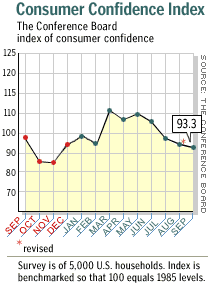NEW YORK (CNN/Money) -
U.S. consumer confidence fell in September, a private research group said Tuesday, as the pillar of the economy's strength continued to show signs of weakness.
The Conference Board said its closely watched index of consumer confidence fell to 93.3 from an upwardly revised 94.5 in August.

Though it was the fourth straight decline for the index, it was still better than the 92.4 reading most economists, on average, expected, according to Briefing.com.
"This is probably a good sign -- not a massively strong sign, but a good sign," former Federal Reserve Governor Susan Phillips told CNNfn's Market Call program.
The report helped ease some earlier losses in U.S. stock prices, while Treasury bond prices lost some of their earlier gains.
The report came as Fed policy makers met to discuss their target for short-term interest rates. They were widely expected to leave rates alone, as they've done all year following 11 rate cuts in 2001.
Consumer spending is closely watched by the Fed and other economists because it makes up about two-thirds of total U.S. gross domestic product (GDP), the broadest measure of the economy.
Consumer spending held strong through a recession that began in March 2001, terrorist attacks, corporate scandals, falling stock prices and more than 1.5 million layoffs.
But unemployment has stayed at about the same level most of the year, and new jobs have been scarce, as businesses are reluctant to spend money and expand their production until they're sure the economy is recovering.
Though the Conference Board said its Present Situation Index, measuring how consumers feel about the current state of the economy, dropped to 88.5 from 93.1 in August, it said its expectations Index -- measuring how consumers feel about the economy's future prospects -- rose to 96.5 from 95.5
"[Consumers] are more optimistic about the outlook than last month," Lynn Franco, the Conference Board's consumer research director, said in a note. "Historically, this trend is prevalent during a recovery."

|

